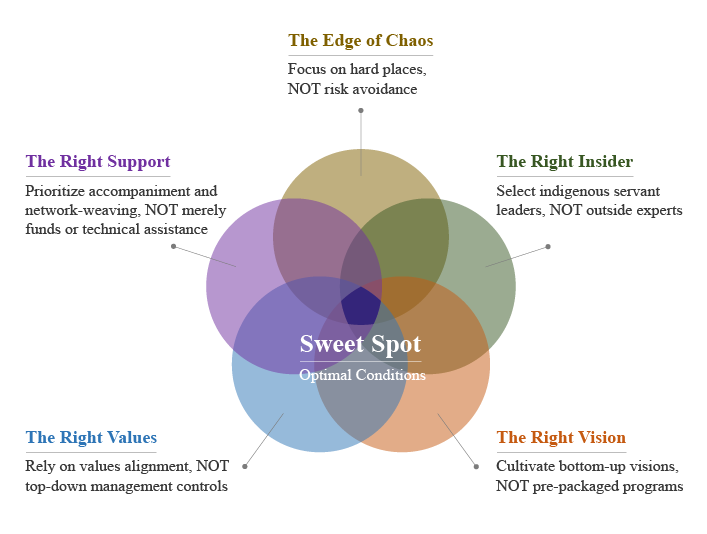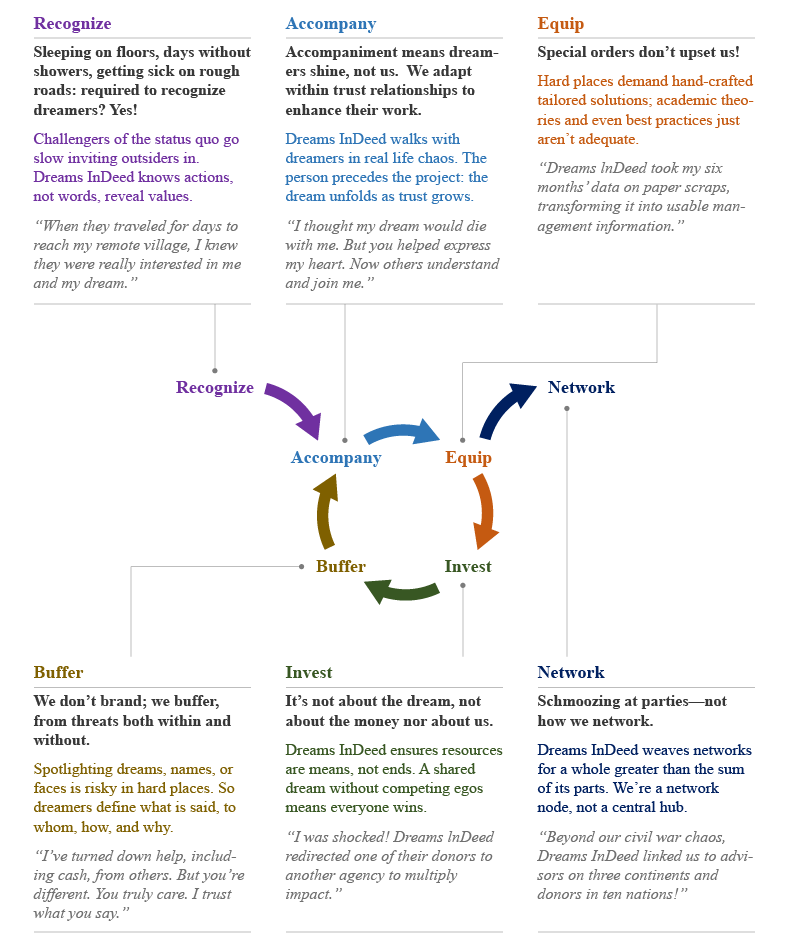What We Do
We strengthen local visionaries, who live in and are from hard places, so that their dream for a transformed community, where the poor celebrate life, becomes a light inviting all to participate.
Our Theory of Change
Our theory of change proposes that five factors are needed to sustain change with the poor.

Our Operating Model
These are the types of support needed by social entrepreneurs in hard places.
- Recognize – a mutual process to discover a win-win relationship
- Accompany – walk together through thick and thin
- Equip – customize requested inputs
- Invest – enough to keep going but not enough to succeed
- Buffer – only relate what the visionary wants
- Network – weave relationships as a node not a hub

Our Published Research
Our rigorous field research and peer-reviewed publications confirm our confident hope that light overcomes in hard places. The evidence documents how the Dreams InDeed approach delivers mission impact against the odds. Because global challenges today dwarf even the most heroic individual efforts, we offer our hard place experience to all to synergize with us for our bold vision of “a light in every hard place in our generation.”Beyond Car Bombs: Keys for Transformative Impact
Haskell, David, (Nov 4, 2015), ‘Beyond Car Bombs: Keys for Transformative Impact’, in Stanford Social Innovation Review, available at: https://ssir.org/articles/entry/beyond_car_bombs_keys_for_transformative_impact
Trust rooted in shared dreams and values can find a way forward at the edge of chaos.
From Sectarianism to Solidarity: A Vital Role for Social Entrepreneurs in the Middle East and North Africa
Haskell, D.L., Haskell, J.H. & Kwong, J.W. (2015), ‘From Sectarianism to Solidarity: A Vital Role for Social Entrepreneurs in the Middle East and North Africa’, in Jamali, D. & Sidani, Y. (eds.), Social Entrepreneurship in the Middle East: Volume 2, (London: Palgrave Macmillan).
Read More
Offre Joie, an indigenous Lebanese movement with an extraordinary vision to “gather the entire family of Lebanon, a treasure for humanity,” is transcending the chronic challenge of sectarianism. This case study assesses the efficacy of the Offre Joie theory of change that sectarian divisions can be overcome by combining an inspiring and inclusive vision; practice of the values of respect, forgiveness, and love; volunteer service; and intergroup engagement. Given the statistically significant outcomes and noteworthy impact of the attitude and behavior change of Offre Joie volunteers, social entrepreneurs should harness these elements to invigorate the social entrepreneurship ecosystem in the Middle East.
Harnessing Values for Impact Beyond Profit in the Middle East and North Africa.
Haskell, D.L., Haskell, J.H. & Pottenger, J.J. (2012), ‘Harnessing Values for Impact Beyond Profit in the Middle East and North Africa’, in Jamali, D. & Sidani, Y. (eds.), CSR in the Middle East: Fresh Perspectives, (London: Palgrave Macmillan).
Read More
Are core values such as love and respect mere sentimental slogans? Or are they pivotal to sustained impact in hard places? Egyptian social entrepreneur Dr Magda Iskander teamed up with Dreams InDeed to confirm that values propel performance, delivering mission impact far beyond profits.
In her Cairo medical practice, Dr Magda had observed that elderly and chronically ill patients ready for hospital discharge did not return home. Why? Egypt’s over 80 million people had no hospice or home health care services available. At the same time, Dr Magda couldn’t help but notice the thousands of women and young people without work.
The uncared for. And the unemployed.
Dr Magda envisioned potential where others saw only burdens. From this vision came Care with Love, her Egyptian home healthcare social enterprise that trains the unemployed to serve the uncared for.
Care with Love achieved all its start-up objectives. Nearly 1000 put to work with honor. Nearly 1500 housebound patients cared for with love. Sustainable profits from fee revenue alone. And the dignified profession of home health care established with official status and international acclaim.
A resounding success story? Not quite yet.
Care with Love’s efforts to scale impact by franchising were frustrated. Medical skills transferred, but love was lacking. How could Care with Love ensure values assimilation to sustain mission impact?
Dr Magda and Dreams InDeed then collaborated with a diversity of Care with Love stakeholders to develop a contextualized values curriculum drawn entirely from Egyptian sources, including the Bible, Islamic texts, and cultural folklore.
Caregiver performance comparisons before and after the values curriculum demonstrated statistically significant improvements. Yet even more remarkable were the stories of changed lives, bridging chasms of class and sect.
The social enterprise model profoundly transcended a mere fee-for-service transaction. Patients were sustained by love, not just medical care. Caregivers were motivated by respect, not just wages. Love and respect sustain community.
Values are not words on brochures. Values at work deliver mission impact.
Commissioned by Dr Dima Jamali and Dr Yusuf Sidani, faculty of the American University of Beirut Olayan School of Business, and with the gracious permission of Palgrave Macmillan, the pre-publication proof of Harnessing Values for Impact Beyond Profit in MENA, chapter two of the complete edited volume cited below, is available for download on this website.
Jamali, D. & Sidani, Y. (eds.) (2012) CSR in the Middle East: Fresh Perspectives, (London: Palgrave Macmillan) is available here.
A Values-Driven Social Entrepreneurship Theory of Change
Haskell, D.L., Haskell, J.H., & Kwong, J.W. (2009). ‘Spiritual Resources for Change in Hard Places: A Values-Driven Social Entrepreneurship Theory of Change’, in Goldstein, J.A., Hazy, J.K., & Silberstang, J. (eds.), Complexity Science and Social Entrepreneurship: Adding Social Value Through Systems Thinking (Litchfield Park, AZ: ISCE Publishing).
Read More
Dreams InDeed founders, David Haskell and Janice Hayashi Haskell, took a 2005-06 sabbatical to reflect on their two decades in hard places of the Middle East and Africa. Their development experience had ranged from street children, marginalized women, the mentally challenged, garbage recyclers, subsistence farmers, and AIDS orphans, to disaster casualties of earthquake, sectarian violence, and all-out war.
Against the backdrop of international development and management literature, they considered the outcomes of what had brought about sustained change, and what had fallen short. At Harvard, David researched social entrepreneurship and leadership development; at Tufts Fletcher School of Law & Diplomacy, Janice concentrated on the role of values in human development.
A values-driven theory of change and operating model emerged, presented first at Harvard, Tufts, and Oxford in 2006 and 2007, and then at the first International Conference on Complexity, Systems Thinking and Social Entrepreneurship at Adelphi University School of Business in 2008. In summary, that model indicates that at the edge of chaos in hard places, the right insider with the right values and the right vision needs the right minimal support to leverage sustained change with the poor.
Adelphi and ISCE Publishing invited the Haskells and Dreams InDeed board member Jennifer Kwong, to publish their findings in Complexity Science & Social Entrepreneurship: Adding Social Value Through Systems Thinking. The authors wish to thank ISCE Publishing and volume editors Jeffrey A. Goldstein, James K. Hazy and Joyce Silberstang for permission to make this chapter available for download on this website.
